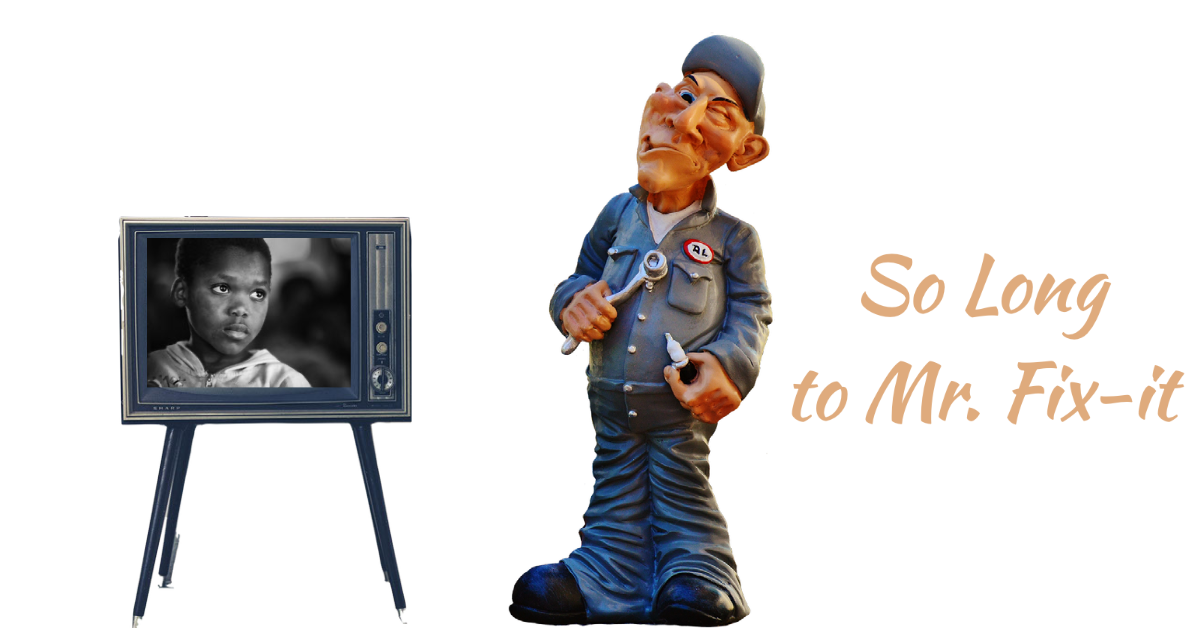So Long to Mr. Fix-it
Yesterday, I sat in a faculty meeting as part of an ongoing conversation our school is having regarding issues related to race and ethnicity. These are hard discussions because as a group, we're struggling with coming to terms not only with American Christianity's historical treatment of native Americans and African Americans, but with contemporary stories from our colleagues of color and the continual experiences of animosity directed toward them in small and large ways in the communities and the metropolitan areas where they live and work.
The writer David French described his experience with discovering just how many Americans of color experience this ongoing animosity. He and his wife, Nancy, adopted an Ethiopian young woman and she became one of their three children. As they engaged in the normal things that families do, they began to notice something striking. Whenever they would do activities or go places, their African daughter was treated very differently than their two white children. Hostile looks. Questions like, "What are you doing?" Statements like, "You can't be here." Until they discovered that she was part of a white family. The French family got a lesson in the experience of so many persons of color in America. Over the last few years, it has gotten worse. Ahmaud Arberry. George Floyd. Breonna Taylor. White Supremacists marching through Charlottesville; and storming the Capitol. These are the contemporary faces of the injustice directed at Americans of color since the mid-17th century.
In the meeting yesterday, one of my colleagues said something that grabbed my attention. I'll paraphrase his words. "Those of us who have not experienced animosity or hatred directed at us because of the color of our skin often find that our first impulse is to try to fix everyone and everything now. We come up with bold plans. We think we have all of the right answers. Why? Because we are uncomfortable with our discomfort at hearing these stories. Perhaps we need to sit in our own discomfort and let God teach us lessons we don't want to hear."
God directed that right to me. I'm an activist, fix-it person by nature. When I hear about a problem, my first response is usually to ask what needs to be done to fix this, or at least start to fix it. Perhaps I jump to fix-it mode because I don't want to be uncomfortable for long. Why should I be uncomfortable? Perhaps I'm uncomfortable because I live in a world where I don't have to think about race, where I don't have to negotiate a society whose long-term hostility toward persons of color continues to be manifested not only in large ways, but in the small everyday interactions of life. My friends and colleagues who are African American tell me about having "the talk" with their kids, meaning that they have to tell their teenage sons and daughters how to act when they are stopped by the police for no apparent reason. It happens all of the time.
So, I need to sit with my discomfort, even welcome it and not pretend that I can "fix" these realities. I'm blessed that God has brought my way a number of non-white people who have become good friends and colleagues. I need to listen to their stories, and let the reality of their everyday lives sit with me and make me uncomfortable.
That does not mean that I resist constructive action to deal with issues related to race and ethnicity in America. At the same time, I'm learning that for all of us there is something even more important than action. The Apostle Paul gets at it in 1 Corinthians 13."If I have the gift of prophecy and can fathom all mysteries and all knowledge, and if I have a faith that can move mountains, but do not have love, I am nothing" (13:2). This morning I'm seeing that passage in a different light and I might paraphrase it this way, "If I can think I can move the mountain of racial hatred, but do not have love, I am nothing." I won't stop looking for tangible ways to address matters of race and ethnicity, but even more important I'm going to listen to my friends and colleagues of color, and I'm going allow myself to live in the discomfort their stories and their experiences bring to me, and I'm going to let their stories reside in my human experience as a constant reminder of the depth of our human depravity, and how desperately all of us need to follow Christ every day that God allows us to live here.

